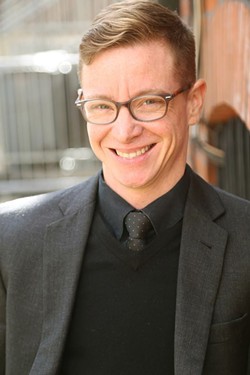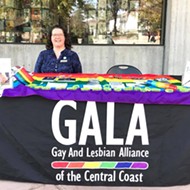Training allies: Tranz Central Coast aims to meet growing demand for transgender trainings in SLO County
By Peter Johnson[{
"name": "Ad - Medium Rectangle CC01 - 300x250",
"id": "AdMediumRectangleCC01300x250",
"class": "inlineCenter",
"insertPoint": "8",
"component": "2963441",
"requiredCountToDisplay": "12"
},{
"name": "Ad - Medium Rectangle LC01 - 300x250",
"id": "AdMediumRectangleCC01300x250",
"class": "inlineCenter",
"insertPoint": "18",
"component": "2963441",
"requiredCountToDisplay": "22"
},{
"name": "Ad - Medium Rectangle LC09 - 300x250",
"id": "AdMediumRectangleLC09300x250",
"class": "inlineCenter",
"insertPoint": "28",
"component": "3252660",
"requiredCountToDisplay": "32"
}]
Tranz Central Coast leaders have observed a phenomenon build up recently: a steady influx of requests from SLO County groups for trainings on how to most respectfully and effectively work with people identifying as lesbian, gay, bisexual, transgender, or queer (LGBTQ).
Sometimes it’s a human resources director at a company who reaches out; other times, it’s a mental health services organization; or a group of educators, therapists, psychiatrists, or physicians.
“It’s needed everywhere,” said Doug Heumann, the chair of Tranz Central Coast, which is the leading local organization supporting and serving transgender community members.
For all the progress made in the past 20 years on LGBTQ rights, advocates like Heumann point out that the vital step of fully incorporating LGBTQ people’s diverse needs and experiences into the norms of society and its institutions is far from complete. When it comes to the transgender community, that’s especially true. Many identification forms still ask for just two gender options: male or female. People are often oblivious to the experiences of someone who’s transgender, going through a transition, or questioning. Using pronouns beyond he, him, she, and her—and learning how to effectively talk about that—is still a stumbling block.
That’s one of the core purposes of the trainings: bringing awareness, education, and conversation about these realities to SLO County.
“When people stumble over language, they feel uncomfortable. And then they’re not as likely to engage in conversation and dialogue because they feel uncomfortable,” said Nancy Sutton, a member of the Tranz Central Coast education committee, which spearheads these trainings. “So there are discussions about language and terminology, discussions about just experiences people have when their gender expression is transgender. There are a lot of vignettes of what their experiences might be like as a way to invite people in a training to take that on and think about that. ... Then, when they’re walking around in the world, or have a business or organization, [they can think about] how they can make that experience more welcoming and affirming for trans individuals.”
The growing demand for LGBTQ education and training is a positive trend, Heumann said, but it’s also overwhelming. The Tranz Central Coast education committee has only six people. The amount of requests from the community has begun to dwarf the group’s capacity.
“There’s only so much of us to go around,” Heumann said. “What we’re trying to do is build up a bigger list of people to send to cover these different things.”
Thinking hard about this issue in March, Tranz Central Coast came up with an ambitious idea: to invite one of the country’s leading transgender trainers to the area for a three-day “Train-the-Trainer.”
Dr. Eli Green, a Philadelphia-based author and educator, accepted the invitation to come to Atascadero on July 18 through 20, and he’ll conduct an “intensive training” for 20 local individuals representing organizations countywide. His training is based on a 20-module book that he co-authored: The Teaching Transgender Toolkit: A Facilitator’s Guide to Increasing Knowledge, Decreasing Privilege and Building Skill.
“He was willing to come out here,” Heumann said. “He was real excited about a rural area of California.”
The goal for Dr. Green’s visit is to build a network of people who will be equipped to deliver high-quality trainings across the Central Coast in diverse settings.
“It’s going to give individuals who have an interest in training an actual resource to use, to go back to their organization and either take some of the modules and put them into their existing staff training, or craft something that’s appropriate for that audience,” Sutton said.
Tranz Central Coast is raising money on GoFundMe to help pay for Dr. Green’s training, and Heumann hopes to also get a boost from a SLO County Community Foundation “Growing Together” grant—which points to another exciting trend that advocates see. More public money and resources are being put toward meeting the needs of the LGBTQ communities.
At the SLO County Behavioral Health Department, Nestor Veloz-Passalacqua, the department’s cultural competence coordinator, has organized similar trainings for county staff this year. “Awareness, acknowledgement, and respect” are at the foundation of the four-hour training, Veloz-Passalacqua said.
“Our intention is to be able to reach out not only to Behavioral Health staff, but our community providers about how to have a more affirming environment when they engage clients,” he said. “We want to spread the knowledge in a way that when clinicians or mental health service providers are engaging with trans community members, they are aware of who they’re talking to, they acknowledge how that person wants to be recognized, and they give them the respect that they need.”
Measuring progress in terms of society’s level of recognition and respect for the transgender community is often a matter of baby steps, Heumann said.
“It can just start with going to the doctor or the hospital, and do they have something that you makes you feel like they acknowledge you exist?” Heumann said.
Despite the hurdles still out there, Heumann said he’s encouraged by the direction SLO County is headed.
“I’m feeling more positive than I have in a long time,” he said. “It’s such a big issue and yet we’re doing a little bit here and a little bit there. There’s an awareness.” ∆
Staff Writer Peter Johnson can be reached at [email protected].
Speaking of Pride 2018
Latest in News
Readers also liked…
-

Coast Unified teachers upset over new position's salary and qualifications
Oct 20, 2022 -

SLO police identify alleged driver who hit and killed couple
Dec 22, 2022 -

When the levee breaks: Oceano residents, county officials walk a tightrope of regulations to manage Arroyo Grande Creek, which some say led to the levee's failure in January
May 18, 2023
















